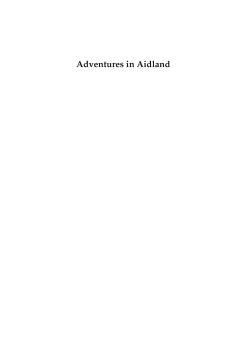
Additional Information
Book Details
Abstract
Anthropological interest in new subjects of research and contemporary knowledge practices has turned ethnographic attention to a wide ranging variety of professional fields. Among these the encounter with international development has perhaps been longer and more intimate than any of the others. Anthropologists have drawn critical attention to the interfaces and social effects of development’s discursive regimes but, oddly enough, have paid scant attention to knowledge producers themselves, despite anthropologists being among them. This is the focus of this volume. It concerns the construction and transmission of knowledge about global poverty and its reduction but is equally interested in the social life of development professionals, in the capacity of ideas to mediate relationships, in networks of experts and communities of aid workers, and in the dilemmas of maintaining professional identities. Going well beyond obsolete debates about ‘pure’ and ‘applied’ anthropology, the book examines the transformations that occur as social scientific concepts and practices cross and re-cross the boundary between anthropological and policy making knowledge.
David Mosse is Professor of Social Anthropology, School of Oriental and African Studies, University of London. He has also worked for Oxfam in south India, as a social development adviser for DFID, and as a consultant for various international development agencies. Recent books include Cultivating Development: An ethnography of aid policy and practice (2005); The Aid Effect: Giving and Governing in International development (2005, ed. with D. Lewis); and Development Translators and Brokers (2006, ed. with D. Lewis).
“Laden with personal accounts and experiences of the development industry and its exclusive processes of knowledge production and circulation, Adventures in Aidlandis an invaluable contribution to the study and practice of development. The realities presented in Mosse’s collection will enrich the education of socio-cultural anthropology students, particularly those considering research on organisations that operate in the industry of global poverty. The social, economic and political shortfalls of professionalism, as they are laid out in the book, make it exceptionally relevant to anthropological work in development, heralding new directions for its scope and impact in the design of policy to reduce global poverty.” · Durham Anthropology Journal
“The contributions are framed by a brief, but rich introductory chapter that contextualizes the anthropology of professional expert knowledge. The volume is concluded by a wonderful (in several meanings), entertaining essay by Raymond Apthorpe.” · Forum for Development Studies
“By denying developing countries cultural specificity, aid agencies can arrogantly perpetuate their own insularity. This is fascinating and underexplored territory for anthropologists and development theorists alike, making this an important collection.” · Times Literary Supplement
“Themes are…consistently woven throughout the book, particularly ethnographic approaches considering mechanisms by which expert knowledge is transmitted…This book fills a gap in the consideration of expert knowledge and its application to consultancy that has not been addressed since Morris and Bastin (2004).” · Anthropological Forum
Table of Contents
| Section Title | Page | Action | Price |
|---|---|---|---|
| Adventures in Aidland | i | ||
| CONTENTS | v | ||
| PREFACE AND ACKNOWLEDGEMENTS | vii | ||
| Chapter 1: INTRODUCTION | 1 | ||
| Chapter 2: CALCULATING COMPASSION | 33 | ||
| Chapter 3: RENDERING SOCIETY TECHNICAL | 57 | ||
| Chapter 4: SOCIAL ANALYSIS AS CORPORATE PRODUCT | 81 | ||
| Chapter 5: THE WORLD BANK’S EXPERTISE | 103 | ||
| Chapter 6: WORLD HEALTH AND NEPAL | 123 | ||
| Chapter 7: THE SOCIALITY OF INTERNATIONAL AIDAND POLICY CONVERGENCE | 139 | ||
| Chapter 8: PAROCHIAL COSMOPOLITANISM ANDTHE POWER OF NOSTALGIA | 161 | ||
| Chapter 9: TIDY CONCEPTS, MESSY LIVES | 177 | ||
| Chapter 10: CODA | 199 | ||
| NOTES ON CONTRIBUTORS | 221 | ||
| INDEX | 225 |
